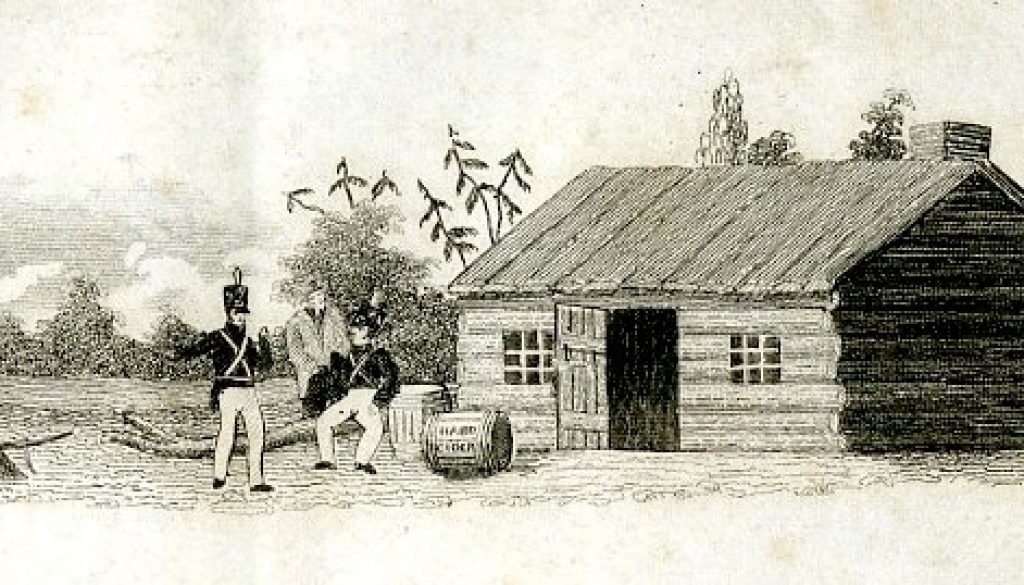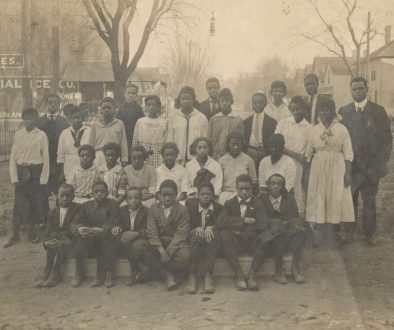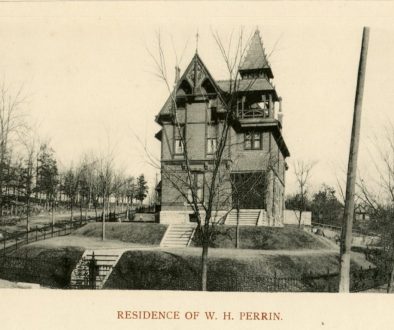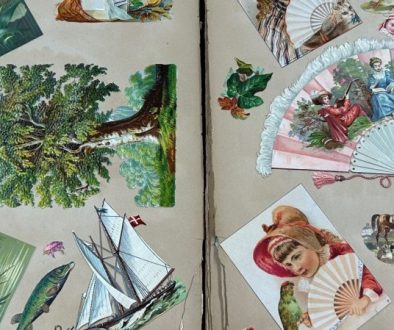“Tippecanoe and Tyler, Too!”
The Great Whig Rally of 1840 Part II
By Julie Dichtl
This article first appeared in the TCHA newsletter, Weatenotes Vol. 24, No. 3, March 1991
Editor’s note: The author served at TCHA as Volunteer Coordinator and Weatenotes editor before joining St. Elizabeth Hospital as Director of Volunteer Services in June, 1988.
John Parsons of Petersburg, Virginia remembered: “Among the men, so Colonel Vawter told me, were revolutionary soldiers, heroes of Fort Meigs, and survivors of Tippecanoe. And it was my good fortune to hear some of these last named describe the battle – the attack, in the darkness that is greatest just before the dawn, the heavy firing, the loud voice of the Prophet urging on his men, the charge, the repulse of the enemy, their flight – the pursuit and the burning of the Prophet’s Town – as I heard these stories from the lips of the heroes, my heart thrilled and I, too, caught the fire of enthusiasm for their cherished leader!”
“Arriving finally at the battle ground, we sought the elevated point of woodland said to have been the site of General Harrison’s headquarters twenty-nine years before, and discovered the whole woods and the lower level of the prairie for a long distance to be filled with tents, wagons, flags, banners and streamers, in the midst of which lay the plat of ground encircled by a board fence, where rest the bodies of those who fell in the great battle.”
“Among the countless attractions, the barbecue had for me the greatest interest. In one great trench were cooking whole carcasses of shoats, sheep and oxen, dressed and spitted, with carvers continually cutting and serving with their long sharp knives. In another trench, burgoo, a rich and well-seasoned soup of many ingredients, was boiling over a slow fire. Three tables, each 100 yards long, were heaped with the food, and with corn and wheaten rolls, all this bounteous supply free to all who came, and again and again, the table company was changed and the supply renewed until at last all were filled.”
Then and not until then, did my friend Colonel Vawter mount the platform, and with his great voice, rich and full, call the multitude together and invoke the blessings of the Lord upon them, intrusting the meeting then to General Jonathan McCarthy. Colonel Vawter had already told me on our journey the story of Spier Spencer and his Yellow Jackets and when I saw the procession of the heroes of Tippecanoe who, clustered together, came forward at this moment to the speakers’ stand under the tattered banner of that fallen hero brought hither for this purpose, the tears sprang to my eyes.” (1)
Judge Polke, who served under Harrison during the Battle of Tippecanoe, presented the torn and bullet riddled flag of Captain Spencer’s company from the Battle to James Brooks of New York City to demonstrate to men who criticized Harrison what the soldiers and Harrison had faced and to prove that Harrison wasn’t a coward.
Brooks responded: “I am a happy man to have such a happy errand. My fellow Citizens of New York will profoundly feel the value of the treasure you entrust to me to be exhibited to them. Thousands and tens of thousands of eyes will greet it there, and bless the soldiers who have given them this consecrated argument to redress their wrongs. So tattered and torn; so thickly pierced with bullets; so venerable now by age, and so holy in its associations; there it is, and how it speaks for itself; and who dare call them cowards, that stood upon this small enclosure, exposed to the peril of this Flag – none being more exposed than your beloved commander in chief! This Flag, then, from you venerable men, presented here where so many of your comrades are buried, where some of you were wounded; where all have now assembled to give as it were, your dying testimony, will go from the West to the North and East as the most inspiring voice you could send there.”
… for if the winning of provinces for Rome won ovations for the conquerors, what triumphs should your Harrison not have, who saved whole Empires for his country; avenging all the cruelties of the savage upon you, but the success of his arms, not only upon your soil, but after the surrender of Hull, by the recovery of Michigan, and that most brilliant of victories on the Thames in Upper Canada. New York gave him in person a glorious welcome during the late war, when he was returning through the city to the Western country; and the appearance of this Flag from the soldiers of Tippecanoe cannot but awaken all its ancient patriotism.”(2)
Another who spoke during the rally was Charles H. Test of Wayne County, Indiana, who condemned the current administration and spoke of the courage and sacrifice made by the soldiers at the Battle of Tippecanoe, led by the Whig’s own William Henry Harrison. Test pledged that Harrison would restore the country to what it was meant to be by the founding fathers and the soldiers of the Revolutionary War.
“They (the crowd at the rally) listened and brooded over the wrongs they were suffering till they became almost wild. To hold water before a dog troubled by rabies would not throw him into a fit more heavily than for the orator of the day to hold up one of those ragged, broken bank bills before the people. It made them mad, it threw them into fits, they felt deeply wronged and their cry was ‘No change for the worse!’ A change in the administration was the only hope for the nation.” (3)
R. H. Eldridge’s journal entry for May 30, 1840, noted: “A great many, perhaps a third, have left Battle Ground and the decrease can hardly be noticed. They are now continually passing through town on their way home, all in the best humor imaginable, singing and laughing. The boats are busily employed from town to the ferry until evening, when they took on board all those they had brought in and left with cheers and the firing of cannon and small arms.”
“May 31 – Our town which has been so crowded with strangers the past week is now getting settled again, although a number of strangers are still here. Through the whole Convention with road traffic and river traffic not a single accident has been reported, no breaking of arms or legs and no deaths occurred. Quite a record, we feel, and we’re proud of it.” (4)
In addition to the importance of the Battle Ground Rally to Harrison’s successful election to the presidency, it also played an important part in creating the model for future political campaigns. After 1840, campaign songs became a standard feature as did the use of banners, ribbons, and buttons for promoting the candidate. Although the Whig Party is no more, its lasting influence can be seen in the hoopla, songs, color and emotional speeches of today’s political campaigns.
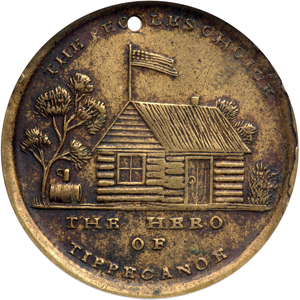
Footnotes
1 A Tour Through Indiana in 1840, from the diary of John Parsons of Petersburg, Virginia, pp. 86-88.
2 Whig Rally Address of Mr. Brooks of New York City.
3 Crumley, Lucille McB. “Something for Tomorrow.”
4 Diary of R. H. Eldridge, Lafayette resident during 1840.

